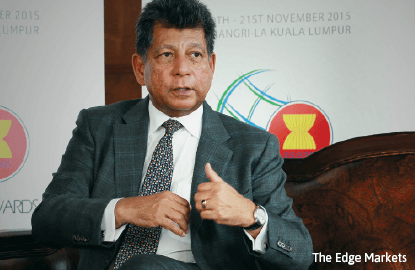
This article first appeared in The Edge Malaysia Weekly, on October 26 - November 1, 2015.
Tan Sri Mohd Munir Majid doesn’t want to equate Asean to a child, but he is aware that his views of the region often liken it to a raw prodigy.
“You don’t give up on something with great potential. (For instance) if you see a child with great potential — I’m not saying Asean is a child — and it has bad habits or it doesn’t work hard enough, you don’t give up [on the child],” he says.
The great potential, often espoused by Asean leaders and economists, is that the region collectively can be the fourth largest economy in the world by 2050 — which is a goal worth striving for, he says.
However, he often gets frustrated with the rhetoric as some of the region’s politicians and populace overlook this vast market they can tap, and resist the movement for change.

“I don’t put any faith in political leaders. But if the private sector and Asean officials work together, they can push and make this benefit happen, and realise this eventuality [Asean being the fourth largest economy by 2050],” Munir says in an exclusive interview with The Edge.
As chairman of the Asean Business Advisory Council Malaysia, Munir and his team are officially mandated by the region’s leaders to ensure there is more private sector input for a smooth implementation of the Asean Economic Community (AEC).
One issue dogging Asean’s private sector is the lack of productivity among the small and medium enterprises (SMEs), according to Munir. These enterprises produce only one-third of the region’s output, but employ around 70% to 90% of the workforce.
Last year, Malaysian SMEs made up 35.9% of the country’s gross domestic product, up from 32.2% in 2013. But the sector’s employment share of the workforce was 65%, a substantial increase from the previous year’s 57.5%, according to the SME Annual Report 2014/15.
As the increase in employment share outweighed the rise in economic contribution, SME Corp Malaysia said these firms saw a 6.6% decline in productivity.
Apart from the lack of technological know-how and efficiency, Munir says these SMEs lack access to finance to grow their operations — and he says these problems are interlinked.
“Many of these SMEs don’t use enough technology and their management systems are quite poor. They don’t keep proper books. So, when they look for financing, banks will say, ‘Sorry, mate. You don’t have proper accounts’,” he says.
SMEs — “the backbone of the economy” as Munir calls them — need to be taken care of. “If the backbone is fractured, the whole economy will be in trouble. If unemployment rises, the more AEC-averse countries like Indonesia might ramp up protectionist measures, and the whole integration process will go down the drain.”
With this view, Munir says Asean BAC aims to transform the SMEs. The council will launch the SME Master Plan, which will also include financing assistance for these firms, during the Asean Business & Investment Summit 2015 on Nov 21 and 22.
Like it or not, competition is coming
“All of these [deficiencies] need to be changed if SMEs are not to be supplanted by foreign companies coming into the market. But don’t blame the AEC alone for this. We have FTAs [free trade agreements] with Japan, China, India and Australia.
“Even countries outside Asean are seeing the huge potential of this region. Why can’t Malaysia or Indonesia see it this way? Takut (scared),” he says.
Whether the single-market-averse countries like it or not, Munir says, competition is coming. In Malaysia’s case, with the many FTAs that the country has signed, it won’t just come from Asean members. Companies from the US, China and other economies are bound to come too.
Yet, to Munir, it is necessary for Malaysia to be a part of many FTAs in order to become more competitive and transparent — even the upcoming Regional Comprehensive Economic Partnership (RCEP) and the controversial Trans-Pacific Partnership (TPP), of which he is a strong advocate and in whose negotiation process he was involved.
Munir says he supports these trade pacts to ensure transparency and competitiveness meet global standards.
There are people who are afraid that the TPP will threaten Malaysia’s sovereignty, as “American industrial interests will try to get compensation from various states”. To these people, Munir says, “You cannot assume that there is no law or there won’t be any justice in such disputes. We can’t assume that one side will always win just because they started proceedings.”
This is why Malaysia has to be more modern and transparent. “We have to grow up,” Munir says.
He admits there might be areas that would lose out or be affected if or when the TPP is implemented, such as the tobacco and pharmaceutical industries. But for labour-intensive countries such as Malaysia, there are definitely going to be benefits from this trade pact, which is set to be the largest in the world.
“Even the US Democrats oppose the TPP because they say Americans will lose their jobs when companies move their operations to countries with cheaper labour cost. In that case, which country is going to gain? It’ll be Malaysia,” Munir points out.
The resistance and lack of action by countries in ensuring the AEC is implemented smoothly has been widely reported. Non-trade barriers, like quotas or complicated customs processes, which have been the bane of the AEC, are still an issue that the Asean BAC is trying to resolve.
“We are looking to set up a portal on the Asean BAC website that would receive, process and advertise complaints by companies on problems they are facing. So the countries will feel a certain responsibility when they decide to commit and do something about it,” says Munir.
Save by subscribing to us for your print and/or digital copy.
P/S: The Edge is also available on Apple's AppStore and Androids' Google Play.